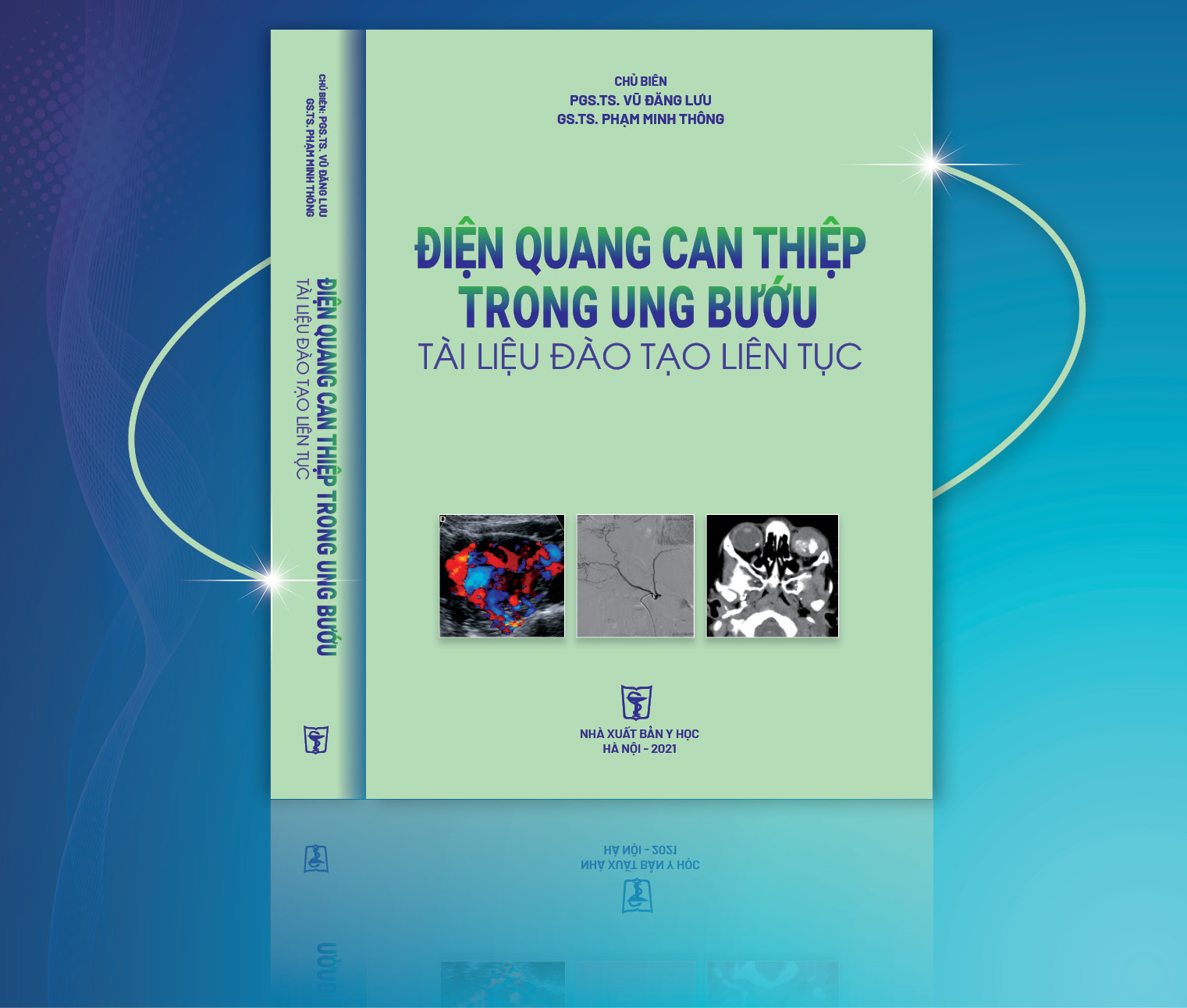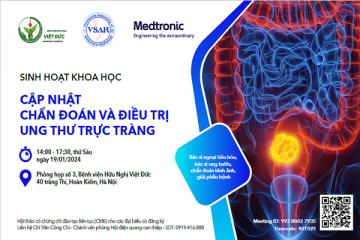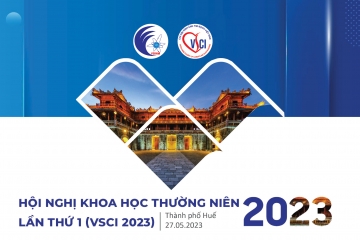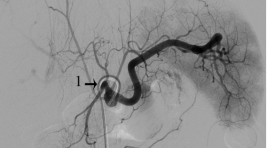
Biến thể giải phẩu động mạch gan trên 300 trường hợp chụp mạch máu số hóa xóa nền
30/03/2020 14:11:17 | 0 binh luận
Variant Hepatic arterial anatomy in 300 patients underwent digital subtraction angiography SUMMARY Objective: to evaluate and describe the prevalence of hepatic arterial variants seen at digital subtraction angiography. Materials and methods : data were collected at Interventional Unit in Diagnostic Imaging department of Viet Duc hospital from May 2015 to May 2016. Results: 300 cases underwent at least one visceral angiographic examination during the study period. 232 (77.3%) cases had standard hepatic arterial anatomy. 14 (4.7%) cases had replaced left hepatic artery. 11 (3.7%) cases had replaced right hepatic artery. 2 (0.7%) cases had variant anatomy involving replacement of both left hepatic artery and right hepatic artery. 16 (5.3%) cases had accessory left hepatic artery. 3 (1%) cases had accessory right hepatic artery. 1 (0.3%) case had both left and right accessory hepatic artery. 12 (4%) cases had replaced common hepatic artery. 3 (1%) cases had double hepatic artery. 1 case had replaced common hepatic artery and accessory left hepatic artery at the same time. 1 case had right hepatic artery arises from aorta and left hepatic artery arises from left gastric artery. Conclusion : in this study the percent of standard hepatic artery is larger than previous published study while the percent of cases had other variants of hepatic artery is smaller. In 2 cases, we saw uncommon variants which weren’t described in previous study. However we didn’t see some other uncommon variants which were described in other study. Keyword : Hepatic artery, anatomy, variant, DSA.
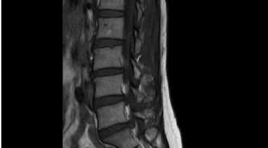
Bước đầu đánh giá hiệu quả ngắn hạn của phương pháp tiêm thẩm phân chọn lọc rễ thần kinh vùng thắt lưng dưới hướng dẫn cắt lớp vi tính
30/03/2020 11:44:19 | 0 binh luận
Primary result: the short - term efficacy of selective nerve root block for lumbar radicular pain under ct guidance SUMMARY Purpose : Evaluating the short-term efficacy and the safety of SNRB method in treating lumbar discal herniation pain. Methods :prospective, 24 patients with lumbar disc herniation treated by SNRBfrom February to June 2016, the contrast media is used to identify the nerve root before ịnjecting compound of Corticosteroid and Lidocain under CT guidance. Measurements of pain (with pain scale Visual Analogue Score - VAS) and mobility (Disability Index OSWESTRY - ODI) were compared at 1 day, 2 week, 1 month and 3 months after the procedure. Results : 27 roots are blocked/24 patients, pain scores were significantly reduced compared with before treatment at every follow-up period. The preprocedural mean VAS score was 5.9. At follow-up, mean VAS scores ranged from 1.9 to 2.4. The pretreatment mean ODI score was 43,6 and it ranged from 9,8 to 19 at follow-up, none grave complication. Conclusion :S.N.R.B for lumbar radicular pain is a simple and safe procedure, but its effect is quite high. It is recommended to perform before surgery. Keywords : SNRB, discal herniation.
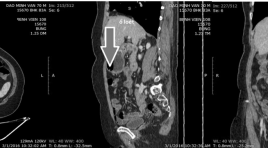
Nghiên cứu chẩn đoán giai đoạn trước phẩu thuật của ung thư dạ dày trên chụp CLVT đa dãy
30/03/2020 13:05:11 | 0 binh luận
Preoperative starging of gastric cancer by multiple detector computed tomography SUMMARY Objective: The aim of this study was to evaluate the accuracy of multiple detector computed tomography (MDCT - BRIVO CT 385-GE Japan) in the preoperative staging of gastric cancer, prospectively comparing CT findings with pathological findings confirmed at biopsy during upper endoscopyand at surgery. A total of 74 consecutive patients with primary cancer recruited between December2015 to July 2016 were submitted to preoperative MDCT staging according to a standard protocol. All diagnostic procedures were performed by two dedicated radiologists who were unaware of the final pathological results. All patients were diagnosed with primary gastric cancer, confirmed at biopsy during upper endoscopy. CT results for T and N staging were in agreement with pathological findings,with overall accuracy of 83,8% (62/74) and 81,1% (60/74%, respectively. Higher specificity for T and N earlier stages (both 100%). Higher accuracy and sensibility for all T and N stages (78,9-94,6% for T and 80,9-96,6% for N). Our findings show a good performance of the diagnostic staging TNM performed with MDCT. Keywords: Gastric Cancer, MDCT, Staging, Oncologic Imaging.
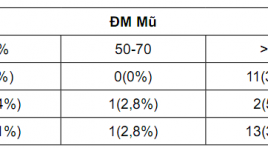
Nghiên cứu vai trò chuỗi xung tưới máu gắng sức cộng hưởng từ tim trong chẩn đoán bệnh tim thiếu máu cục bộ
30/03/2020 11:11:24 | 0 binh luận
Diagnostic performance of stress perfusion cardiovascular magnetic resonance for detection of Ischemia Heart Disease SUMMARY: Objective: Evaluation of the diagnostic of stress perfusion cardiovascular magnetic resonance for the diagnosis of significant obstructive coronary artery disease in comparison to invasive coronary angiography. Material and Methods: 36 patients with suspected ischemic heart disease/ 25 males (69.4%) with mean age: 65.53 ± 10.48 year underwent 1.5 Tesla CMR including cine, short axis to evaluate EF, EDV, ESV, stress PERF (adenosine 140 μg/min/kg), rest PERF (SSFP, 3 short axis, 1 saturation prepulse per slice) and LGE (3D inversion recovery technique) using Gd-BOPTA. Images were analyzed visually. Stenosis >50% in invasive angiography was considered significant. Results: Mean study time was: 45.44 ± 9.18 minutes, EF: 45.06 ± 15.66%, Hypokinesia: 44.4%, Akinesia: 27.8%. The overall patient-based analysis demonstrated a high sensitivity, specificity and PPV for perfusion was 93.3%; 83.3%; 96.6% and moderate NPV 71.4%. A good relation (p<0.01) between deficit perfusion state correlation with coronary stenosis of LAD, RCA, LCx . Conclusion: Stress perfusion CMR with Adenosine is highly sensitive and specificity for detection of coronary artery disease. Keywords: Cardiac Magnetic Resonace (CMR), diagnose, coronary artery disease, ischemia heart disease (IHD), coronary artery, perfusion, Adenosine.
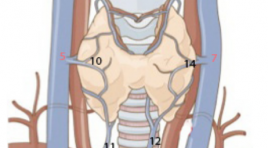
Áp dụng kỹ thuật lấy máu siêu chọn lọc tĩnh mạch vùng cố định lượng PTH chẩn đoán bệnh lý cường cận giáp nguyên phát
23/05/2020 11:31:05 | 0 binh luận
Application of selective parathyroid venous sampling technic in patients with primary hyperparathyroidism SUMMARY Primary hyperparathyroidism (HPT) is a common endocrine disease causing hyper level of serum Calci, that effect on the systemic organs, even mortality. Most patients have one adenoma but some patients have multiglandular disease or etopic gland disease. Patients undergoing surgery are often cured with the success rate of 95% and the complication rate of lower than 3%. The non-invasive techniques to determine the location of gland disease includes ultrasound, CT scanner, MRI, scintigraphy… The sensitivity of these techniques is about 90%. In patients with HPT have negative imaging studies and in persistent HPT after operation, it impossible to determine the gland disease before operation. We present an additional diagnostic tool for this situation, selective venous sampling technique. Veinous sampling technic of the neck through the catheter for PTH testing on patient’s hyperparathyroidism is valuable to locate the position of parathyroid tumors. Keywords: selective venous sampling, hyperparathyroidism.
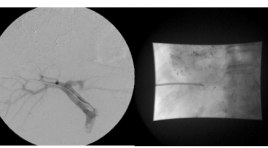
Đánh giá tính an toàn và hiệu quả của kỹ thuật nút tắc tĩnh mạch cửa phải bằng dù kim loại gây phì đại gan trước phẫu thuật
23/05/2020 12:27:11 | 0 binh luận
The assessement of the safety and efficacy of preoperative portal vein embolization using an Amplatzer vascular plug (AVP ) SUMMARY Purpose : To determine the safety and efficacy related to the use of Amplatzer Vascular Plugs (AVP) for preoperative portal vein embolization. Subjects and methods : Between 7/2011-7/2012, a total 16 AVP were embolized into the portal vein of 12 patient (HCC) prior to extended hepatic resection where the residual liver volume (RLV) was deemed sufficient (RLV < 30% in patient with normal liver, RLV <40% in patient with liver cirrhosis. AVP were used combined with gel foam in 5 patients and histoacryl in 7 patient. Result : The procedure was technically successful in 100% of cases. The rate of RLV growth was from 30 to 233 cm3 (mean at 133cm3). The rate surgical was 75% (3 patients were excluded: one insufficient growth of RVL, two metastasis). There were no major complication and minor complication in two patients: abdominal pain. Conclusion : AVP appear to be safety an effective for the preoperative embolization of portal vein, with low morbidity and sufficient growth of RLV. Key word: Amplatzer Vascular Plugs, portal vein embolization.
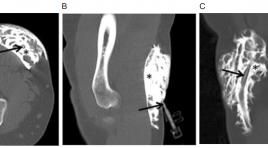
Thoát thuốc tương phản trong thăm khám hình ảnh
31/03/2020 22:21:01 | 0 binh luận
Contrast Media Extravasation Injury SUMMARY Extravasation of contrast medium during injection, especially when doing contrast-enhanced CT, is now a common problem. The risk factors include patient factors, the class of contrast medium used, and the injection technique. The mechanisms discussed are effects of osmolality, cytotoxicity, volume, and compression. The clinical picture varies from no subjective complaints to pain, ulcers, and compartment syndrome. However, nearly all cases can be effectively handled by simple conservative treatment with a cold pack and elevation of the arm. The treatment and follow-up of the patient must be documented.
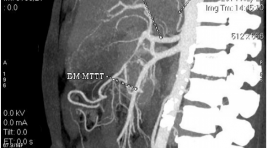
Nghiên cứu biến thể giải phẩu động mạch gan trên CLVT 64 dãy
31/03/2020 22:04:09 | 0 binh luận
Variations of the hepatic arteries with 64 detector computer tomographic angiography SUMMARY: Objectives: The aim of our study was to determine the frequency of different variants of hepatic artery with multi-detector computed tomography (MDCT). Patients and methods: A total of 500 patients consecutive abdominal CT angiography performed on a 64 row CT system were evaluated. Anatomical findings were grouped according to the Michels classification. Results: An anomalous arterial pattern was observed in 20% of the cases (n=500). The most common abnormality was Michels type III (7.4%), followed by type IX (3%), type V (2.8%), type VIII (2.6%), type II (1.2%) , type VI (1%) s. Type IV, VII and X was not observed in our study. Unclassified variations were observed in 2% of the cases. Conclusions: The new generation of 64 row MDCT allows detailed visualization of the vascular anatomy. The knowledge of variant anatomy may assist in the selection of treatment options and surgical planning, which in turn facilitates surgical dissection and helps avoiding iatrogenic injury. Key Words: CT angiography, Hepatic artery.
Bạn Đọc Quan tâm
Sự kiện sắp diễn ra
Thông tin đào tạo
- Những cạm bẫy trong CĐHA vú và vai trò của trí tuệ nhân tạo
- Hội thảo trực tuyến "Cắt lớp vi tính đếm Photon: từ lý thuyết tới thực tiễn lâm sàng”
- CHƯƠNG TRÌNH ĐÀO TẠO LIÊN TỤC VỀ HÌNH ẢNH HỌC THẦN KINH: BÀI 3: U não trong trục
- Danh sách học viên đạt chứng chỉ CME khóa học "Cập nhật RSNA 2021: Công nghệ mới trong Kỷ nguyên mới"
- Danh sách học viên đạt chứng chỉ CME khóa học "Đánh giá chức năng thất phải trên siêu âm đánh dấu mô cơ tim"

